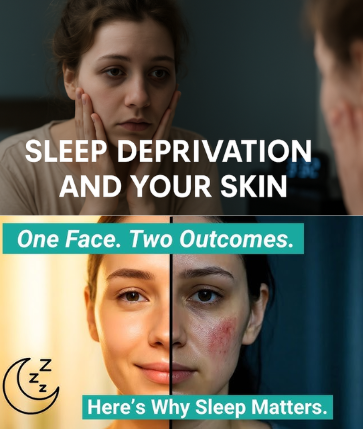
We often think of sleep as just a time to recharge our mind, but it’s also the most powerful natural beauty treatment we have. During the night, your skin shifts from defense mode to repair mode—fixing daytime damage, renewing cells, and strengthening its barrier. Skip sleep for one night and your body may cope, but consistent sleep deprivation leaves visible marks on your skin. Let’s uncover how insomnia and poor sleep habits sabotage your complexion and what that means for your overall glow.
Why Sleep Is Vital for Skin Renewal
Your body operates on a circadian rhythm, guided by the sun. During the day, skin protects against UV rays and environmental stressors. At night, repair takes center stage. This is when blood flow to the skin increases, collagen is rebuilt, and toxins are flushed out. Without adequate rest, this cycle is disrupted, leaving your skin vulnerable, dull, and prematurely aged. Think of sleep as your skin’s night shift—skip it too often and the work simply doesn’t get done.
Lack of Sleep Deprives Skin of Nourishment
Sleep isn’t just rest; it’s restoration. While you’re asleep, your body clears away dead cells and generates fresh ones. Around 60% of old cells are replaced daily during this process, which is why a good night’s sleep leaves you looking refreshed. Without it, renewal slows, and the results are obvious: a tired face, rough texture, and lifeless complexion. Just as skipping meals robs your body of nutrients, skipping sleep robs your skin of vital renewal.
Sleep Deprivation Triggers Dehydration
Have you ever noticed your skin looks duller after a late night? That’s because poor sleep throws off the skin’s moisture balance. The pH level drops, reducing its ability to hold water. As a result, your complexion dries out, redness and uneven tone appear, and breakouts become more frequent. Dehydrated skin also shows fine lines more clearly and contributes to swollen eyes or puffiness. Without enough hydration from within, no moisturizer can fully mask the damage.
Video : How Sleep Impacts Your Skin: Improve Your Skin Health
Weakened Immunity and Skin Vulnerability
Sleep is also linked to your immune system. When you’re sleep-deprived, the body struggles to defend against bacteria and inflammation. That’s why people with chronic insomnia often notice more breakouts, especially stubborn cystic acne. A weak immune system also makes it harder for the skin to repair wounds, fight irritation, or recover from sun exposure. Simply put, poor sleep lowers your skin’s defense shield, leaving it open to constant attack.
Weight Gain and Sagging Skin
Here’s something surprising: missing sleep can actually change your hormones. When you don’t rest enough, the body produces more ghrelin—the “hunger hormone.” This triggers increased appetite, leading to overeating and weight gain. As weight fluctuates, skin stretches and loses firmness, eventually leading to sagging. Pair that with less collagen production from disrupted sleep, and the skin’s structure weakens further, making fine lines and loose texture much more visible.
Dark Circles and Puffy Eyes: The Tell-Tale Sign
Dark circles are the most common and obvious sign of sleep deprivation. While you sleep, blood vessels constrict and circulation improves. Without rest, these vessels dilate, creating the shadows under your eyes. Add fluid retention from sleeping in awkward positions—like on your stomach—and puffiness worsens. Makeup might hide it temporarily, but the only true cure is consistent, quality sleep. Skipping it night after night guarantees under-eye bags become your permanent accessory.
How Good Sleep Naturally Transforms Skin
The benefits of proper sleep go beyond avoiding damage—they actively enhance your skin’s radiance. During deep sleep, growth hormones repair tissue, collagen firms the skin, and oxygen supply improves tone. This means clearer, more hydrated, glowing skin without the need for expensive treatments. Rest truly is the most affordable beauty therapy, with results that no cream can replicate. And yes, sweet dreams are a bonus.
Video : How Does Sleep Affect Your Face?
Conclusion
Chronic sleep deprivation isn’t just tiring—it’s visible on your face. From dryness and breakouts to sagging skin and dark circles, the damage of insomnia shows up quickly and lingers. Sleep is the skin’s best chance to detox, rebuild, and glow naturally. By treating rest as a priority, not a luxury, you protect your skin from premature aging and allow it to repair itself the way nature intended. Bottom line: sleep well, and your skin will thank you with radiance, resilience, and youthfulness.


